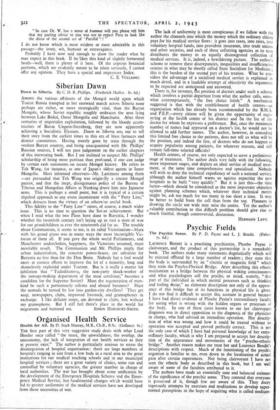Organised Health Service
Health for All. By D. Stark Murray, M.B., Ch.B., B.Sc. (Gollancz. 6s.) THE first part of this very suggestive study deals with what Lord Horder once called " the maze, the unwieldiness, the overlap, the uneconomy, the lack of integration of our health services as they at present exist." The author is particularly anxious to stress the disintegration of hospital organisation: there are large numbers of hospitals ranging in size from a few beds in a rural area to the great institutions for our medical teaching schools and in our municipal hospital services ; there are a great variety of clinics, some run and controlled by voluntary agencies, the greater number in charge of local authorities. The war has brought about some unification by the development of the, Emergency Hospitals Scheme and the Emer- gency Medical $ervice, but fundamental changes which would have led to greater uniformity of the medical services have not developed from those necessities of war. uniformity is most conspicuous if we follow with the author the channels into which the money which the ordinary citizen pays for his medical service flows : it goes into taxes, into rates, into voluntary hospital funds, into provident insurance, into trade unions and other societies, and each of these collecting agencies in its turn distributes the money to an equally disintegrated collection of medical services. It is, indeed, a bewildering picture. The author's scheme to remove these discrepancies, inequalities and insufficiencies centres in what may be shortly called State Socialism for Medicine ; this is the burden of the second part of his treatise. What he con- siders the advantage of a socialised medical service is explained in much detail, and in a laudable attempt of objectivity the arguments to be expected are anticipated and answered.
There is, for instance, the position of doctors under such a scheme which involves a partial departure from what the author calls, some- what contemptuously, " the free choice fetish." A mechanism suggested is that with the establishment of health centres—an organi,sation which has already been recommended by the B.M.A. and P.E.P.—every citizen will be given the opportunity of regis- tering at the health centre of his district and 5n the list of the doctor for whom he expresses a preference. But, once the maximum numbel of names had appeared on a doctor's list, he would not be allowed to add further names. The author, however, in conceding this limited free choice to the patients, does not tell us what will be the position, and indeed the fate, of doctors who do not happen to acquire popularity among patients, for whatever reasons, and still remain full-time salaried officials?
Health centres, of course, are only expected to serve a preliminary stage of treatment. The author deals very fully with the following, more important stages, and depicts an ideal service of medical treat- ment, at the same time comprehensive and specialised. Nobody will wish to deny the technical expediency of such a national service, although the author himself warns us against expecting the new hospitals to be built " very quickly." But it is just this—the time factor—which should be considered as the most important objection against planning schemes which, whatever their technical merits might be, ask too much for too many in too short a time. It may be better to build from the cell than from the top. Planners in drawing the circle too wide may miss the centre. Yet the-author's valuable contribution to this difficult problem should give rise to much fruitful, though controversial, discussion.
The lack of uni
HERMANN LEVY.


























 Previous page
Previous page